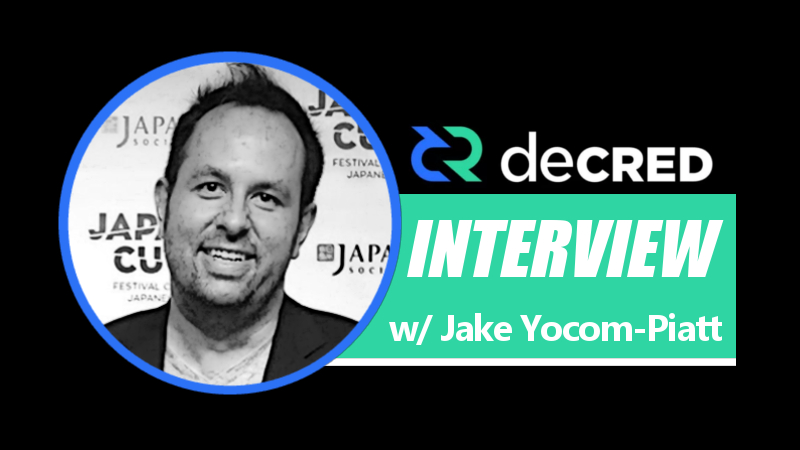
One of the biggest issues facing the Bitcoin community is governance, as the decision-making process is becoming more and more centralized due to rapidly growing mining operations. This has ultimately left Bitcoin’s improvement process in the hands of large mining companies, leading independent factions to drive a number of controversial forks, including Bitcoin Cash, Bitcoin Gold, Bitcoin Diamond and the unsuccessful SegWit2x.
Seeing the self-limiting nature of these issues, a few Bitcoin developers made the decision to branch off completely and build their own project, where a fairer form of governance would be the main focus. That is when Decred was born.
Decred is a cryptocurrency that leverages a hybrid proof-of-work (PoW) and proof-of stake (PoS) consensus model to create a unique internal voting system. Decred’s ability to quickly find consensus among the influencing governance parties has freed the core development team to drive a number of current and upcoming innovations, including a transparent off-chain public proposal system, successful Atomic Swaps, and the eventual integration of the Lightning Network.
We sat down with Decred Project Lead, Jake Yocom-Piatt, to get his views on the current crypto landscape and to learn more about where Decred is heading in 2018 and beyond.
SludgeFeed: What has been your approach to building Decred, and how would you compare it to the cryptocurrency space as a whole?
Yocom-Piatt: In 2016 and 2017, there was a huge rise of ICOs with people raising money, mostly on the Ethereum blockchain. They would sell you promises then you’d give them money and receive a token in exchange. That really isn’t the model that we’d choose.
We are approaching things from a sort of organic, grassroots angle, in the sense that we’re not raising a bunch of money and selling promises. Instead, we said to ourselves, “We don’t really need money, so let’s not raise it in the first place.” We’re trying to create a sustainable ecosystem that can run for decades, as opposed to trying to pile money up high right now just to burn through it.
We plan on continuing this organic, ground-up approach throughout 2018 until the project funding is fully decentralized so that there are no single points of failure.
How do you view the current crypto landscape moving forward in 2018, given looming regulation and issues like the crypto advertising ban?
In terms of ICOs, things have seemed to have calmed down in 2018 and I’m guessing we’re going to see a lot more regulatory action. I strongly suspect that this advertisement ban, which I’d classify as a “soft ban,” is a precursor to some form of regulatory action.
From a governance perspective, how do you see the Decred project standing out from the competition looking to build a similar system?
We’ve tried to take our time and do it right, rather than do it quickly. There are a couple other projects that are, in a sense, ahead of Decred. One of them is Dash, which has been doing the hybrid proof-of-work/proof-of-stake model for a while with their masternode infrastructure.
We try to differentiate ourselves, in terms of governance, by doing it right and doing it right the first time, as opposed to going back and having to change things. The biggest example being that all of our consensus changes only occur when they are explicitly confirmed by our stakeholders.
What happens with a system like Dash, is that they propose a change, people vote on that change, and they go ahead and make the change in a centralized fashion. What we do instead is ask people if they’d like the change, make that change, then we push it out on the network so that it could be activated by people’s votes. This makes it cryptographically binding, whereas other governing systems are not.
We’d like to continue that sort of theme until we get to the point where we can decentralize control of our treasury fully.
Can you speak more about this system of treasury decentralization?
So, we’re going to start with the soft voting in 2018, in the sense that people can vote to spend, say, $100,000 on a conference and then the funds will be dispersed. But we will eventually step past that and get to the point where people can vote directly on each treasury decision, and the votes will release the funds instead of having a centralized intermediary flipping the switch.
In recent Q&As, you have touched on a few additional upcoming features, including privacy plans. Would you like to speak to that at all?
In terms of our privacy plans, they’re private for now. In the near future, we will be releasing something that works (but is not finished), so that people can lay their hands on it. The point being, that making privacy work and making it proper takes a lot of dev work, and doing it all in private is more than we’d like to do because it would take it too long. We will publish a partial working code in the not-so-distant future, and we expect to have something interesting in the next few months.
Switching gears a bit: Back in 2017, you completed an Atomic Swap with Litecoin. How did that come about and what is your relationship with Litecoin founder, Charlie Lee?
In early 2017, Charlie Lee was made aware of the project. He looked at Decred and really liked it because it bore a lot of similarities to the Proof of Activity paper that he was one of the co-authors of. From there, he invited me to Coinbase and I gave a talk.
To the best of my knowledge, Charlie is still a stakeholder in the Decred network, he episodically shows up and we chat, and in terms of Atomic Swaps, he worked with us to verify that it worked on the Litecoin side. And the reason we decided to work with him on the Atomic Swap, was that he was a really well-known guy in the cryptocurrency community and very friendly, and we wanted to get some light on these tools. We’re obviously not the first group to have an Atomic Swap on-chain, there are some other projects that had beaten us to the punch, but in terms of having a readily usable tool where you could add other currencies, we’re the first one. And we’re giving it away for free, whereas other projects are hoping to capture a fee from putting the tool into play.
Yesterday I did an on-chain atomic swap of 1.337 LTC for 2.4066 DCR w/ @_alyp_ of @decredproject. (See txns: https://t.co/BlxU1QBK2U) ⛓️⚛️💱🚀 https://t.co/wPqzdw40Gp
— Charlie Lee Ⓜ️🕸️ (@SatoshiLite) September 20, 2017
We believe it’s a great tool that everybody should have access to, and ultimately where we’re going with this is that we’re going to be publishing a proposal [in the next month or so] for a decentralized exchange that uses on chain, and potentially off chain, Atomic Swaps as the machinery that allows people to have a truly decentralized exchange.
This DEX won’t directly benefit Decred, but given the current exchange situation where places like Binance ask an enormous listing fee, which is basically a bribe, we think it can do a lot of good. I don’t think the current exchange listing process is constructive moving forward for the ecosystem.
Are there any upcoming milestones or features that you’d like to highlight, perhaps the Lightning Network integration?
A really major milestone that we’re moving towards is the SPV wallet support, and we have a release candidate that is out now. It has support for compact filters which are different than bloom filters. Compact filters basically allow people to avoid all of the privacy leaks that are associated with bloom filters, and it’s a true SPV wallet as opposed to a centralized service you have to phone home to. We should have the SPV wallets rolled out in the next four to eight weeks.
Regarding the Lightning Network, it’s a bit of black box and I can’t really forecast anything with that. Getting it to work with Decred has been a real bear, so we are still fighting with that and it will be out the door soon.
In terms of things that are coming, a lot is going to happen at once. Lightning Network, privacy, SPV are all going to be released semi-concurrently.
Finally, how is your team growing and evolving in 2018?
We’re always looking for more developers, that is usually the limiting reactant for most cryptocurrency projects. We would like more Golang developers, more JavaScript developers, and people who have experience with React and Redux. We’re also looking for some Python people.
From a growth perspective, we have roughly 20 people who are active at this point and we hope to double that in the long run. We have plenty of development organization funds to pay people, so it’s a question of getting people to show up.



























